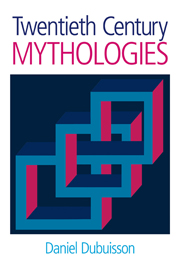Book contents
- Frontmatter
- Epigraph
- Contents
- Foreword by Professor Robert A. Segal
- Preface
- Abbreviations
- Introduction: History and comparative epistemology
- Part I Georges Dumézil, or Society
- Part II Claude Lévi-Strauss, or the Mind
- Part III Mircea Eliade, or the Sacred
- 12 Fascism and mysticism
- 13 Primitive ontology
- 14 The eternal return of anti-Semitism
- 15 The neo-paganism of homo religiosus
- 16 Metaphysics and politics: Eliade and Heidegger
- Addendum III Esotericism and fascism
- Addendum IV The reconstruction of prehistoric religions
- Addendum V The Eliadean conception of symbolism
- Addendum VI Forgetting the Shoah
- Conclusion: Modern theories of myth and the history of Western thought
- Bibliography
- Index
12 - Fascism and mysticism
from Part III - Mircea Eliade, or the Sacred
- Frontmatter
- Epigraph
- Contents
- Foreword by Professor Robert A. Segal
- Preface
- Abbreviations
- Introduction: History and comparative epistemology
- Part I Georges Dumézil, or Society
- Part II Claude Lévi-Strauss, or the Mind
- Part III Mircea Eliade, or the Sacred
- 12 Fascism and mysticism
- 13 Primitive ontology
- 14 The eternal return of anti-Semitism
- 15 The neo-paganism of homo religiosus
- 16 Metaphysics and politics: Eliade and Heidegger
- Addendum III Esotericism and fascism
- Addendum IV The reconstruction of prehistoric religions
- Addendum V The Eliadean conception of symbolism
- Addendum VI Forgetting the Shoah
- Conclusion: Modern theories of myth and the history of Western thought
- Bibliography
- Index
Summary
Those who attended successive courses in 1947–48 and 1948–49, given by Dumézil, Lévi-Strauss, and Mircea Eliade (1907–1986) in the Fifth Section of the École Pratique des Hautes Études in Paris must have been rare indeed. Moreover, they proved by the originality of their choice that they were both eclectic and remarkably intuitive; for Eliade at the time was still an obscure, exiled Romanian, and Lévi-Strauss had scarcely completed his thesis. Dumézil at least had made no mistake: he had intervened so that Lévi-Strauss, on returning from the United States in 1949, would be welcomed into the prestigious institution. He had also seen to it that Eliade be offered the possibility of giving two sets of lectures (in 1946 and 1948).
Eliade's long sojourn in Paris extended from September 1945 to September 1956, when he was named Professor of History of Religions at the University of Chicago, at which time his renown spread to all institutions with specialization in the field. He died in Chicago in May 1986, a few short months before Dumézil. For thirty years, thanks to his teaching and his numerous publications, Eliade was one of the most renowned historians of religions, and without doubt the most universally celebrated. Within his prolific oeuvre, four types of work may be distinguished. First are the novels – uneven, fraught with mystery and irrationality - which we will not dwell on here.
- Type
- Chapter
- Information
- Twentieth Century Mythologies , pp. 173 - 188Publisher: Acumen PublishingPrint publication year: 2006



